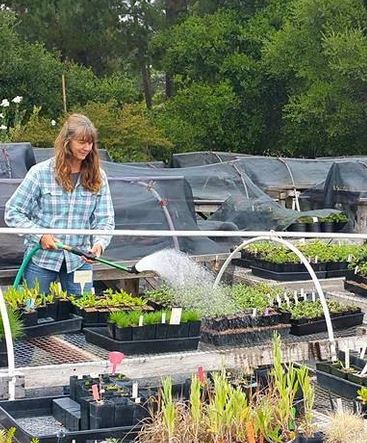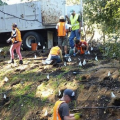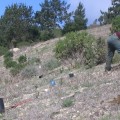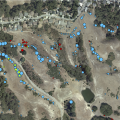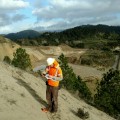Nursery Best Management Practices (BMPs) for Phytophthora tentaculata
For over a year now, Central Coast Wilds (CCW) has been working diligently to respond to an emerging issue in restoration: the spread of a newly discovered plant pathogen called
Phytophthora tentaculata. Phytophthora is a fungal organism known as a water mold. It causes root rot in many woody species and threatens wildlands. It may sound familiar because a different species, P. ramorum, is the cause of Sudden Oak Death. As with allPhytophthoras, nursery container stock can be one of the vectors. In its efforts to produce disease-free plants, CCW has worked with the CDFA and others in the restoration community to elevate its BMP’s above customary nursery standards. Improved management practices include the following:
- Improved propagation hygiene (designated “clean” areas for all propagation activities that require decontamination procedures before entry);
- Utilization of new or sterilized pots only (it must be assumed that any soil residue on used pots is contaminated);
- Sterilized delivery trucks;
- Nursery phytosanitary production practices training and certification of nursery staff;
- Proper storage of seeds and propagules;
- Working with customers to prepare a delivery site that keeps the plants off the ground until the time of planting;
- Elevation of all plants off the ground (plants are kept on tables or pallets to prevent the flow of water under and around them); and
- Inspection and testing (all plants are inspected weekly for root rot or crown decay. If root rot is detected, plants are tested for Phytophthora using ELISA (an enzyme assay test) kits.
Additional BMP’s that we offer for a fee include the following:
- Using only sterilized propagation and potting mixes. These are not currently commercially available via horticulture suppliers and must be produced on site with a steam sterilizer; and
- Producing extra plantsin order to perform destructive sampling for laboratory analysis.
CCW is committed to producing healthy, disease free plants for habitat restoration and will continue its mission to protect and restore biological diversity in our wildlands for years to come!
